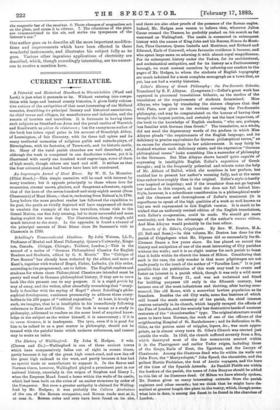Schelling's Transcendental Idealism. By John Watson, LL.D., Professor of Mental
and Moral Philosophy, Queen's University, Kings- ton, Canada. (Griggs, Chicago ; Tritbner, London.)—This is the second of a series of "German Philosophical Classics for English Readers and Students, edited by G. S. Morris." The "Critique of Pare Reason" has already been redacted by the editor, and more of Kant's, together with works of Hegel, Fichte, Leibnitz, (in this order, according to the programme), are to follow. The English readers and students for whom these Philosophical Classics are intended must be pretty well read in German philosophical history, if they are to use a book like this present one to any purpose. It is a rapid precis by way of essay, and the writer, after cheerfully remarking that "every- body is familiar with the saying of Regal" about Schelling's philo- sophical development, continues presumably to address these every. bodies in his 250 pages of "critical exposition." At least, it is only to such, we imagine, that he is intelligible in his immediately following references to Kant and Fichte. If the book is meant as a study in philosophy, addressed to readers on the same level of acquired know. ledge in the subject as the writer himself, it is unnecessary ; if it is in usum tironum, it is inadequate. The tyro, even if it is good for him to be talked to as a put master in philosophy, should not be treated with the painfal haste which eschews references, and cannot stay to make an index.














































 Previous page
Previous page